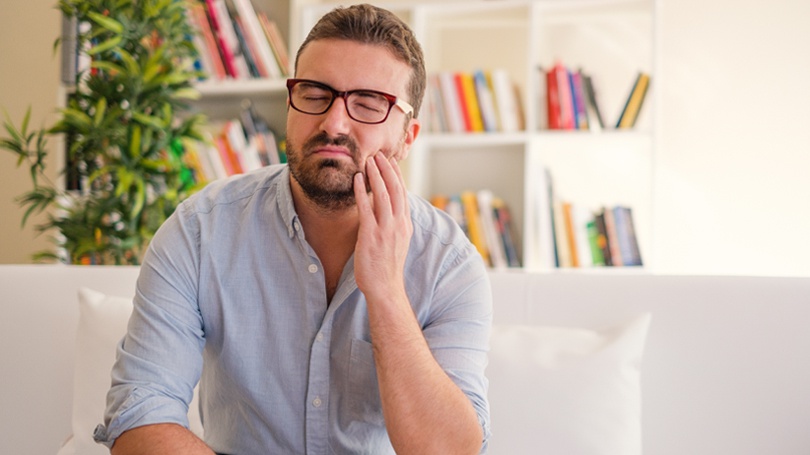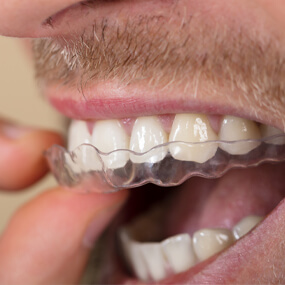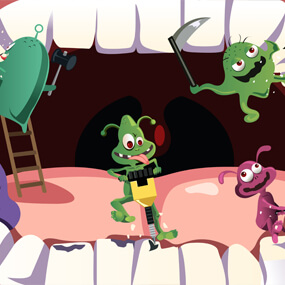Teeth Grinding: What It Is and How to Treat It

Bruxism is a condition in which people grind their teeth and clench their jaws unnecessarily. Nocturnal bruxism is teeth grinding that occurs while you sleep. Sleep bruxism can be chronic or happen occasionally, and in many cases, the affected person is completely unaware that it is happening.
This lack of awareness is problematic. The grinding continues unchecked and wears down tooth enamel as well as the crowns of the teeth, and it can eventually loosen and even break teeth. Patients who are diagnosed with sleep bruxism late in life often require dental implants, crowns, dental bridges, dentures, root canal therapy, and other treatments. Untreated sleep bruxism can also lead to headaches, daytime drowsiness, temporomandibular joint dysfunction, and even changes to your facial shape.
The Causes of Bruxism
It has not yet been determined what causes bruxism. According to the Bruxism Association, however, the disorder is most common in people who suffer from obstructive sleep apnea and other sleep-related disorders, such as sleep paralysis and talking in your sleep. Parkinson’s disease and Huntington’s disease are known to cause bruxism, and modern medicine has identified a number of risk factors:
- Stress
- Caffeine
- Genetics
- Loud snoring
- Jaw or teeth misalignment
- Alcohol, tobacco, and drug use
- Anxiety and depression medications
Current estimates suggest that 70 percent of all teeth grinding is stress-related, and sleep studies have found increased heart rates and brain activity that indicate the central nervous system may be a factor. A recent study in Brazil revealed that 50 percent of all local police officers experienced sleep bruxism and that police were seven times more prone to the disorder than non-police officers in their age group.
The American Academy of Oral Medicine finds that age is a factor. In fact, less than 3 percent of people older than 60 experience bruxism. On the other hand, it is estimated that one-third of children experience bruxism prior to their permanent teeth erupting. In children, it can be due to hyperactivity disorders as well as enlarged tonsils and adenoids, and most grow out of it by age 13.
The Symptoms of Bruxism
Bruxism is diagnosable by dentists, and if you see your dentist every six months, it is highly like that he or she will be able to diagnose it early. Even if the bruxism is not diagnosable through the physical examination, regular checkups often involve digital X-rays that will make the issue evident.
The other way people learn of bruxism is they are told by a bed partner or roommate. If you get such news and are someone who has not seen your dentist regularly, then you will want to schedule an appointment as soon as you can in order to determine what the cause is.
You can also look for the warning signs that you may have bruxism. The Bruxism Association list headaches as the most common symptom of teeth grinding. In fact, teeth grinders are more than three times more prone to headaches than the average person. Other symptoms include:
- Frequent earaches
- Teeth pain and sore gums
- Sensitive teeth
- Face myalgia—pain
- Jaw soreness and pain
- Poor sleep
- Daytime drowsiness
- Shoulder tightness
- Jaw clicking or popping
How to Stop Teeth Grinding
Treating bruxism requires determining the cause, so there may be some trial and error involved. If it seems that your teeth grinding may be linked to stress, anxiety, or depression, then you may need to try relaxation techniques as well as attend cognitive behavioral therapy sessions. In the case you have a misaligned jaw or another dental issue, your dentist will be able to diagnose this. If you are experiencing bruxism due to obstructive sleep apnea, your dentist will recognize this and refer you to a sleep medicine specialist for the final diagnosis. It would not be unusual for you to then return to your dentist to have your sleep apnea and bruxism treated with a custom-fit mandibular advancement device.
Here are some common treatments for nocturnal bruxism:
- Wear a night guard. Bruxism night guards are ideal for those who grind their teeth but not due to sleep apnea. There are generic over-the-counter guards available. But a custom-fit night guard will be more effective and more comfortable and cost you less money over the long-term.
- Wear a mandibular advancement device. A MAD is a mouthguard that treats sleep bruxism but also keeps the tongue in place and the airway open. Your sleep medicine specialist may recommend a CPAP machine instead. Using a CPAP machine will often alleviate the sleep bruxism as well.
- Limit your intake of caffeine and alcohol and particularly just before bedtime. Be aware that using tobacco products and psychoactive drugs can lead to and exacerbate sleep bruxism.
- Avoid chewing gum. Do not chew non-food: toothpicks, pencils, nails, and so on. Avoid foods that require a lot of chewing, such as steak and nuts, because it can cause tension in the jaw.
- Practice good sleep hygiene, which involves establishing a routine and an environment conducive to good sleep. This also means not working in bed. Your brain can associate the bed with work and stress and carry that energy over into your rest.
- Perform relaxation techniques before you go to bed. What works best depends on the individual. Activities you can experiment with include warm baths and showers, massaging devices, deep breathing exercises, yoga, meditation, and so forth.
- You may also want to incorporate relaxation techniques targeted specifically at your jaw into your pre-bedtime ritual. Both massages and warm washcloths can be effective.
- Some people find journaling to relieve stress prior to sleeping.
- Physical therapy may be an ongoing option to manage your bruxism. The American Academy of Craniomandibular Disorders recommends therapy for the treatment of temporomandibular joint disorders because it can relieve pain, reduce inflammation, and restore jaw functions.
- The American Physical Therapy Association cites several studies that demonstrate that acupuncture, in combination with physical therapy, can be effective at treating bruxism.
- The Kent State University Department of Psychology asserts that some people with bruxism respond well to hypnosis therapy and is an avenue worth exploring.
- A recent Turkish study into bruxism found that low-level laser therapy for people with TMJ disorders not only significantly reduced pain but greatly increased the mobility of the jaw.
- EFT tapping is an alternative treatment for emotional distress and physical pain that you can perform on your own. While no studies yet have demonstrated results specifically with bruxism, tapping has fully rehabilitated PTSD patients, and PTSD and bruxism share similarities.
Stop Grinding Your Teeth
If you grind your teeth at night or suspect that you might, it is imperative that you schedule a dentist appointment as soon as possible. Jeffrey D. Clark, DDS, is highly skilled and experienced in diagnosing and treating sleep bruxism. If your bruxism is due to obstructive sleep apnea or other condition, Dr. Clark can refer you to the appropriate specialist and coordinate with that specialist as needed. Call Scottsdale Cosmetic Dentistry Excellence today at 480 585 1853 to learn more and schedule your appointment.




